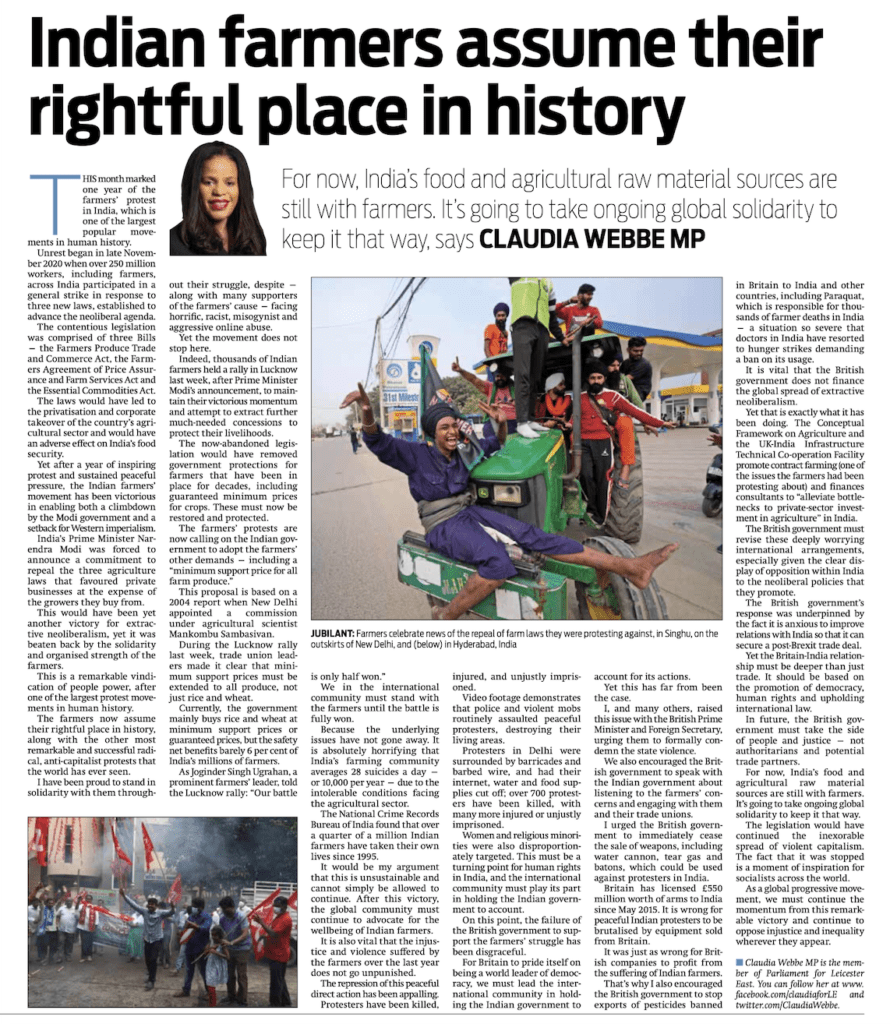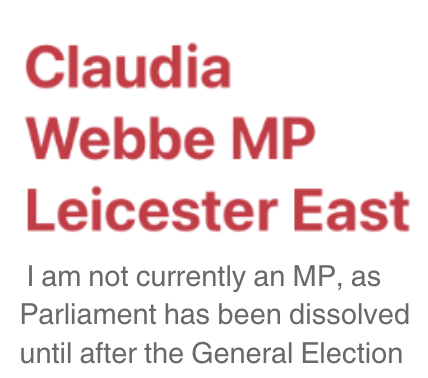
Indian farmers assume their rightful place in history
By Claudia Webbe MP
For now, India’s food and agricultural raw material sources are still with farmers. It’s going to take ongoing global solidarity to keep it that way, says CLAUDIA WEBBE MP
THIS month marked one year of the farmers’ protest in India, which is one of the largest popular movements in human history.
Unrest began in late November 2020 when over 250 million workers, including farmers, across India participated in a general strike in response to three new laws, established to advance the neoliberal agenda.
The contentious legislation was comprised of three Bills — the Farmers Produce Trade and Commerce Act, the Farmers Agreement of Price Assurance and Farm Services Act and the Essential Commodities Act.
The laws would have led to the privatisation and corporate takeover of the country’s agricultural sector and would have an adverse effect on India’s food security.
Yet after a year of inspiring protest and sustained peaceful pressure, the Indian farmers’ movement has been victorious in enabling both a climbdown by the Modi government and a setback for Western imperialism.
India’s Prime Minister Narendra Modi was forced to announce a commitment to repeal the three agriculture laws that favoured private businesses at the expense of the growers they buy from.
This would have been yet another victory for extractive neoliberalism, yet it was beaten back by the solidarity and organised strength of the farmers.
This is a remarkable vindication of people power, after one of the largest protest movements in human history.
The farmers now assume their rightful place in history, along with the other most remarkable and successful radical, anti-capitalist protests that the world has ever seen.
I have been proud to stand in solidarity with them throughout their struggle, despite — along with many supporters of the farmers’ cause — facing horrific, racist, misogynist and aggressive online abuse.
Yet the movement does not stop here.
Indeed, thousands of Indian farmers held a rally in Lucknow last week, after Prime Minister Modi’s announcement, to maintain their victorious momentum and attempt to extract further much-needed concessions to protect their livelihoods.
The now-abandoned legislation would have removed government protections for farmers that have been in place for decades, including guaranteed minimum prices for crops. These must now be restored and protected.
The farmers’ protests are now calling on the Indian government to adopt the farmers’ other demands — including a “minimum support price for all farm produce.”
This proposal is based on a 2004 report when New Delhi appointed a commission under agricultural scientist Mankombu Sambasivan.
During the Lucknow rally last week, trade union leaders made it clear that minimum support prices must be extended to all produce, not just rice and wheat.
Currently, the government mainly buys rice and wheat at minimum support prices or guaranteed prices, but the safety net benefits barely 6 per cent of India’s millions of farmers.
As Joginder Singh Ugrahan, a prominent farmers’ leader, told the Lucknow rally: “Our battle is only half won.”
We in the international community must stand with the farmers until the battle is fully won.
Because the underlying issues have not gone away. It is absolutely horrifying that India’s farming community averages 28 suicides a day — or 10,000 per year — due to the intolerable conditions facing the agricultural sector.
The National Crime Records Bureau of India found that over a quarter of a million Indian farmers have taken their own lives since 1995.
It would be my argument that this is unsustainable and cannot simply be allowed to continue. After this victory, the global community must continue to advocate for the wellbeing of Indian farmers.
It is also vital that the injustice and violence suffered by the farmers over the last year does not go unpunished.
The repression of this peaceful direct action has been appalling.
Protesters have been killed, injured, and unjustly imprisoned.
Video footage demonstrates that police and violent mobs routinely assaulted peaceful protesters, destroying their living areas.
Protesters in Delhi were surrounded by barricades and barbed wire, and had their internet, water and food supplies cut off; over 700 protesters have been killed, with many more injured or unjustly imprisoned.
Women and religious minorities were also disproportionately targeted. This must be a turning point for human rights in India, and the international community must play its part in holding the Indian government to account.
On this point, the failure of the British government to support the farmers’ struggle has been disgraceful.
For Britain to pride itself on being a world leader of democracy, we must lead the international community in holding the Indian government to account for its actions.
Yet this has far from been the case.
I, and many others, raised this issue with the British Prime Minister and Foreign Secretary, urging them to formally condemn the state violence.
We also encouraged the British government to speak with the Indian government about listening to the farmers’ concerns and engaging with them and their trade unions.
I urged the British government to immediately cease the sale of weapons, including water cannon, tear gas and batons, which could be used against protesters in India.
Britain has licensed £550 million worth of arms to India since May 2015. It is wrong for peaceful Indian protesters to be brutalised by equipment sold from Britain.
It was just as wrong for British companies to profit from the suffering of Indian farmers.
That’s why I also encouraged the British government to stop exports of pesticides banned in Britain to India and other countries, including Paraquat, which is responsible for thousands of farmer deaths in India — a situation so severe that doctors in India have resorted to hunger strikes demanding a ban on its usage.
It is vital that the British government does not finance the global spread of extractive neoliberalism.
Yet that is exactly what it has been doing. The Conceptual Framework on Agriculture and the UK-India Infrastructure Technical Co-operation Facility promote contract farming (one of the issues the farmers had been protesting about) and finances consultants to “alleviate bottlenecks to private-sector investment in agriculture” in India.
The British government must revise these deeply worrying international arrangements, especially given the clear display of opposition within India to the neoliberal policies that they promote.
The British government’s response was underpinned by the fact it is anxious to improve relations with India so that it can secure a post-Brexit trade deal.
Yet the Britain-India relationship must be deeper than just trade. It should be based on the promotion of democracy, human rights and upholding international law.
In future, the British government must take the side of people and justice — not authoritarians and potential trade partners.
For now, India’s food and agricultural raw material sources are still with farmers. It’s going to take ongoing global solidarity to keep it that way.
The legislation would have continued the inexorable spread of violent capitalism. The fact that it was stopped is a moment of inspiration for socialists across the world.
As a global progressive movement, we must continue the momentum from this remarkable victory and continue to oppose injustice and inequality wherever they appear.
Claudia Webbe MP is the member of Parliament for Leicester East. You can follow her at www.facebook.com/claudiaforLE and twitter.com/ClaudiaWebbe


